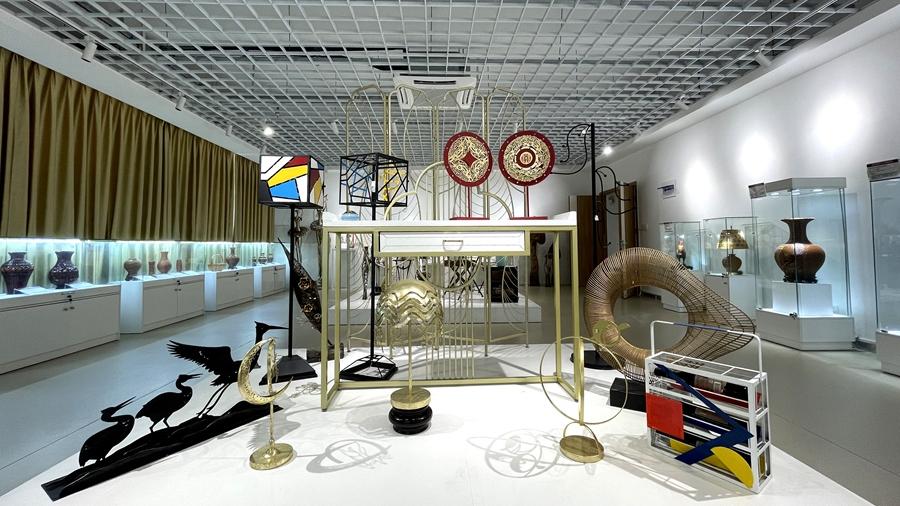Hong Kong embraces innovation, interconnectivity in 2025 through bold reforms
HONG KONG, Jan. 11 (Xinhua) -- The dawn of 2025 heralded a momentous occasion for Hong Kong with the arrival of China's domestically produced C919 passenger jet on its maiden commercial flight to the city in south China.
This event marked a technological breakthrough and Hong Kong's inaugural scheduled service for the jetliner, signaling a fresh chapter in the metropolis's aspirations as a global aviation hub.
As the new year unfolds, Hong Kong is pulsating with energy. The Hong Kong Special Administrative Region (HKSAR) government, alongside various sectors, is gearing up to align with China's 14th Five-Year Plan and the vision articulated by HKSAR Chief Executive John Lee in his latest policy address.
"As long as we work together to uphold integrity, innovate, and pursue reform and development, the 'Pearl of the Orient' will shine even brighter in 2025," Lee stated in a New Year video message on social media.
Over the past weeks, Hong Kong's streets have been buzzing with activity as businesses report a significant influx of Chinese mainland visitors, thanks in part to the central government's policy allowing Shenzhen residents to obtain multiple-entry travel permits to neighboring Hong Kong.
Other supportive policies from the central government are gaining traction, including increased duty-free allowances for luggage articles of Chinese mainland visitors, expanded travel permits for non-Chinese HKSAR permanent residents to enter the mainland as well as the beginning of high-speed sleeper train services linking Beijing and Shanghai to Hong Kong.
In Lok Ma Chau Loop, construction cranes punctuate the skyline, signaling a transformation. "The two buildings over there are rising so quickly. The vision of turning Hung Shui Kiu from farmland into a bustling downtown is within reach," said Chan, a local from Tin Sam Tsuen, Hung Shui Kiu within the Northern Metropolis, a planned area that is expected to help Hong Kong diversify its industries and integrate itself into the overall development of the country.
Notably, the Year 2025 signals a pivotal and transitional moment from the 14th to the 15th national Five-Year Plan. Insiders believe opportunities abound for Hong Kong as the Chinese mainland embraces a new technological revolution.
The Hong Kong Productivity Council, along with 50 other service institutions on the Chinese mainland, has recently been designated jointly by the China National Intellectual Property Administration and the World Intellectual Property Organization as part of the new batch of organizations for establishing Technology and Innovation Support Centers and will commence preparatory work.
Over the past year, Hong Kong's economy has shown positive signs of recovery, backed by the legislation on Article 23 of the Basic Law and its renewed status as one of the world's freest economies. Stock prices have climbed approximately 18 percent, and visitor arrivals have topped 44 million, reflecting a 30 percent year-on-year increase.
The number of companies in Hong Kong with overseas or Chinese mainland parent companies climbed to a historic 9,960 in 2024, up 10 percent from the previous year, showed two recent surveys released by the HKSAR government.
"Blessed with our linkage with our motherland and close connection to the world, as well as the solid backing of our country, including the central government's support and measures benefitting our city, Hong Kong stands to prosper," John Lee said in his latest policy address.
"We must seize every opportunity to make progress and renew ourselves. Indeed, with the wisdom and experiences of Hong Kong people, coupled with the dare-to-fight and win spirit in us, I am confident that Hong Kong will continue to go from strength to strength and attain new heights," he said.
As 2025 progresses, the HKSAR government is advancing reforms aimed at enhancing connectivity and improving livelihoods. Plans include fostering international hubs for post-secondary education and high-caliber talents, as well as establishing 9,500 new light public housing units. Additionally, Hong Kong's first traditional Chinese medicine hospital will begin phased operations.
Eight events of the National Games will be staged in Hong Kong, as the HKSAR co-hosts the country's sporting extravaganza with Guangdong and Macao for the first time in November 2025. Events such as fencing and handball will take place in the landmark Kai Tak Sports Park, which is set to open this year.
Michael Ngai, chairman of the Hong Kong Finance Association, believes the Games will enhance connectivity, boost exchanges within the Guangdong-Hong Kong-Macao Greater Bay Area, and provide a robust impetus for Hong Kong and Macao.
"Looking ahead, the sky is the limit for Hong Kong," said Starry Lee, a member of the National People's Congress Standing Committee. She attributed her confidence to the city's climate of reform as it continues to leverage its strengths and pursue innovation and growth amid stability.
Photos
 Anxi in SE China's Fujian develops rattan iron crafts into industrial chain worth over 10 bln yuan
Anxi in SE China's Fujian develops rattan iron crafts into industrial chain worth over 10 bln yuan Scenery of snow-covered tea plantations in Zunyi, China's Guizhou
Scenery of snow-covered tea plantations in Zunyi, China's Guizhou Woman revitalizes intangible cultural heritage items with a stylish twist
Woman revitalizes intangible cultural heritage items with a stylish twist Cherry blossoms and birds create a winter spectacle in SW China's Yunnan
Cherry blossoms and birds create a winter spectacle in SW China's Yunnan
Related Stories
- Indonesia stresses importance of ASEAN economic ties with China's Hong Kong
- HKSAR chief executive mourns victims of 6.8-magnitude earthquake in Xizang, ready to provide necessary support
- Hong Kong eases requirements for investors under new investment attraction scheme
- China’s central bank to issue huge offshore yuan bills in Hong Kong: media report
- China's central bank to issue 60 bln yuan of bills in Hong Kong
Copyright © 2025 People's Daily Online. All Rights Reserved.





